Saturday, October 10, 2009
Our Blessed Lady's Saturday
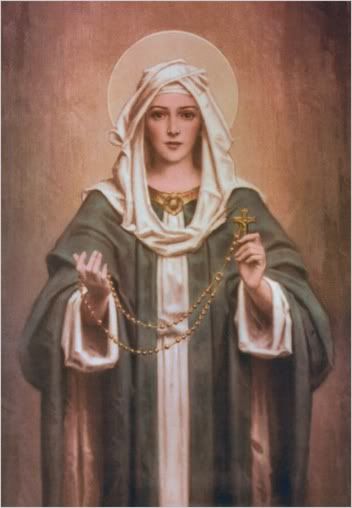
October's Queen
by Dennis A. McCarthy
When the grass was springing,
When the fields were gay,
When the winds were singing
All the happy day,
Then we gathered 'round thee,
Mother dear, and crown'd thee
With the brightest blossoms
Of the meads of May.
Now that the winds are grieving
Over the summer dead,
All the woodlands reaving
Of their riches red,
Once again we're kneeling,
To thy heart appealing,
Twining other garlands
For thy holy head.
Rosy crowns we wrought thee
In thy month of flow'rs,
Rosy crowns we brought thee
From the Maytime bow'rs.
But when roses fail us,
Rosaries avail us;
'Tis with these we crown thee
In October hours.
Denis A. McCarthy
Robert, Cyril, Our Lady's Praise in Poetry,
Poughkeepsie, New York: Marist Press, 1944.
Labels: Our Blessed Lady
Friday, October 09, 2009
Friday At the Foot Of the Cross

BY THE MERIT OF EACH PARTICULAR PAIN WHICH HE SUFFERED IN HIS PASSION
by Saint Alphonsus de Liguori
O my Jesus! by that humiliation which Thou didst practise in washing the feet of Thy disciples, I pray Thee to bestow upon me the grace of true humility, that I may humble myself to all, especially to such as treat me with contempt.
My Jesus, by that sorrow which Thou didst suffer in the garden, sufficient, as it was, to cause Thy death, I pray Thee to deliver me from the sorrow of Hell, from living for ever more at a distance from Thee, and without the power of ever loving Thee again.
My Jesus, by that horror which Thou hadst of my sins, which were then present to Thy sight, give me a true sorrow for all the offences which I have committed against Thee.
My Jesus, by that pain which Thou didst experience at seeing Thyself betrayed by Judas with a kiss, give me the grace to be ever faithful unto Thee, and nevermore to betray Thee, as I have done in time past.
My Jesus, by that pain which Thou didst feel at seeing Thyself bound like a culprit to be taken before the judges, I pray Thee to bind me to Thyself by the sweet chains of holy love, that so I may nevermore see myself separated from Thee, my only good.
My Jesus, by all those insults, buffetings, and spittings which Thou didst on that night suffer in the house of Caiphas, give me the strength to suffer in peace, for love of Thee, all the affronts which I shall meet with from men.
My Jesus, by that ridicule which Thou didst receive from Herod in being treated as a fool, give me the grace to endure with patience all that men shall say of me, treating me as base, senseless, or wicked.
My Jesus, by that outrage which Thou didst receive from the Jews in seeing Thyself placed after Barabbas, give me the grace to suffer with patience the dishonor of seeing myself placed after others.
My Jesus, by that pain which Thou didst suffer in Thy most holy body when Thou wast so cruelly scourged, give me the grace to suffer with patience all the pains of my sicknesses, and especially those of my death.
My Jesus, by that pain which Thou didst suffer in Thy most sacred head when it was pierced with the thorns, give me the grace never to consent to thoughts displeasing unto Thee.
My Jesus, by that act of Thine by which Thou didst accept of the death of the Cross, to which Pilate condemned Thee, give me the grace to accept of my death with resignation, together with all the other pains which shall accompany it.
My Jesus, by the pain which Thou didst suffer in carrying Thy Cross on Thy journey to Calvary, give me the grace to suffer with patience all my crosses in this life.
My Jesus, by that pain which Thou didst suffer in having the nails driven through Thy hands and Thy feet, I pray Thee to nail my will unto Thy feet, that so I may will nothing save that which Thou dost will.
My Jesus, by the affliction which Thou didst suffer in having gall given Thee to drink, give me the grace not to offend Thee by intemperance in eating and drinking.
My Jesus, by that pain which Thou didst experience in taking leave of Thy holy Mother upon the Cross, deliver me from an inordinate love for my relatives, or for any other creature, that so my heart may be wholly and always Thine.
My Jesus, by that desolation which Thou didst suffer in Thy death in seeing Thyself abandoned by Thine Eternal Father, give me the grace to suffer all my desolations with patience, without ever losing my confidence in Thy goodness.
My Jesus, by those three hours of affliction and agony which Thou didst suffer when dying upon the Cross, give me the grace to suffer, with resignation, for love of Thee, the pains of my agony at the hour of death.
My Jesus, by that great sorrow which Thou didst feel when Thy most holy Soul, when Thou wast expiring, separated itself from Thy most sacred Body, give me the grace to breathe forth my soul in the hour of my death, offering up my sorrow then to Thee, together with an act of perfect love, that so I may go to love Thee in Heaven, face to face, with all my strength, and for all eternity.
And thee, most holy Virgin, and my Mother Mary, by that sword which pierced thine heart when thou didst behold thy Son bow down His head and expire, do I pray to assist me in the hour of my death, that so I may come to praise thee and to thank thee in Paradise for all the graces that thou hast obtained for me from God.
Labels: Friday At the Foot Of the Cross
Thursday, October 08, 2009
Bring On the Gi-Normous Gourds!
Wednesday, October 07, 2009
Peak New England Foliage Is Starting

Though you have to be very far north to see peak color. It is still low color here around Boston itself. I hope today's rain doesn't have a bad effect on leaf retention.
Here is the latest report from The Foliage Network.
Labels: New England Things
Our Blessed Lady's Rosary
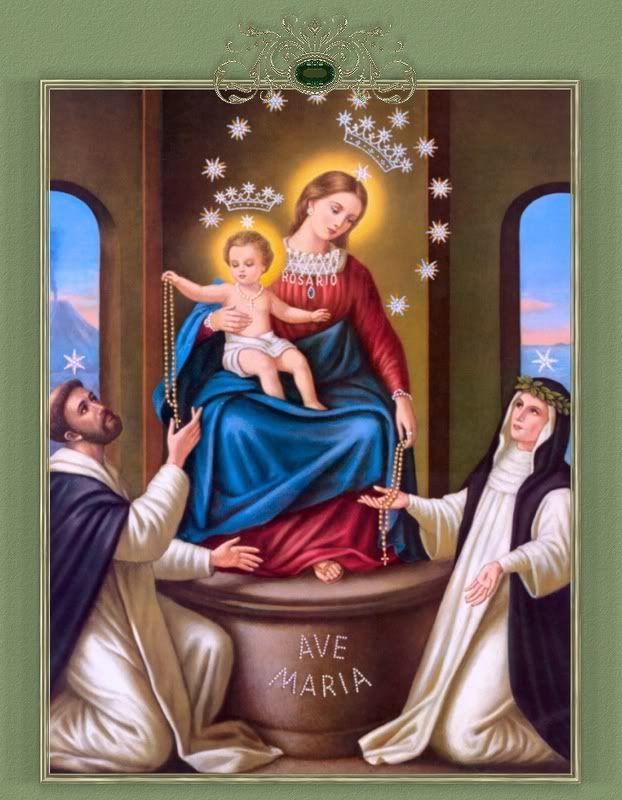
The history of the feast from The Catholic Encyclopedia.
The Fifteen Promises To Those Who Recite the Rosary given By Our Blessed Lady to Saint Dominic:
1. Whoever shall faithfully serve me
by the recitation of the Rosary, shall
receive signal graces.
2. I promise my special protection
and the greatest graces to all those
who shall recite the Rosary.
3. The Rosary shall be a powerful
armor against hell, it will destroy
vice, decrease sin, and defeat heresies.
4. It will cause virtue and good works
to flourish; it will obtain for souls the
abundant mercy of God; it will with-
draw the hearts of men from the love
of the world and its vanities, and will
lift them to the desire of eternal
things. Oh, that souls would sanctify
themselves by this means.
5. The soul which recommends itself
to me by the recitation of the Rosary,
shall not perish.
6. Whoever shall recite the Rosary
devoutly, applying himself to the
consideration of its sacred mysteries
shall never be conquered by misfor-
tune. God will not chastise him in His
justice, he shall not perish by an
unprovided death; if he be just he
shall remain in the grace of God, and
become worthy of eternal life.
7. Whoever shall have a true
devotion for the Rosary shall not die
without the sacraments of the Church.
8. Those who are faithful to recite the
Rosary shall have during their life and
at their death the light of God and the
plentitude of His graces; at the
moment of death they shall participate
in the merits of the saints in paradise.
9. I shall deliver from purgatory those
who have been devoted to the Rosary.
10. The faithful children of the Rosary
shall merit a high degree of glory in
heaven.
11. You shall obtain all you ask of me
by the recitation of the Rosary.
12. All those who propagate the holy
Rosary shall be aided by me in their
necessities.
13. I have obtained from my Divine
Son that all the advocates of the
Rosary shall have for intercessors
the entire celestial court during their life
and at the hour of death.
14. All who recite the Rosary are my
sons, and brothers of my only Son
Jesus Christ.
15. Devotion of my Rosary is a great
sign of predestination.
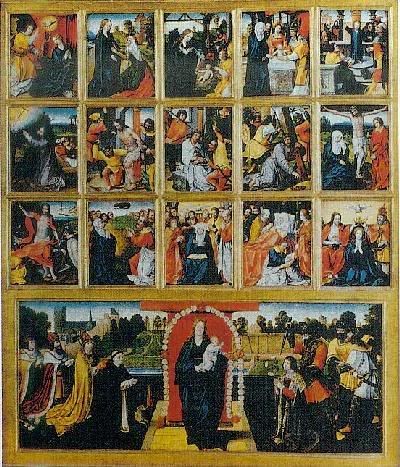
This is the anniversary of the great Catholic victory over the Moslems at Lepanto. We need another great Catholic victory against a Moslem in Christian clothing who seems to be fooling a lot of people today.
Lepanto
by G.K. Chesterton
White founts falling in the Courts of the sun,
And the Soldan of Byzantium is smiling as they run;
There is laughter like the fountains in that face of all men feared,
It stirs the forest darkness, the darkness of his beard;
It curls the blood-red crescent, the crescent of his lips;
For the inmost sea of all the earth is shaken with his ships.
They have dared the white republics up the capes of Italy,
They have dashed the Adriatic round the Lion of the Sea,
And the Pope has cast his arms abroad for agony and loss,
And called the kings of Christendom for swords about the Cross.
The cold queen of England is looking in the glass;
The shadow of the Valois is yawning at the Mass;
From evening isles fantastical rings faint the Spanish gun,
And the Lord upon the Golden Horn is laughing in the sun.
Dim drums throbbing, in the hills half heard,
Where only on a nameless throne a crownless prince has stirred,
Where, risen from a doubtful seat and half attainted stall,
The last knight of Europe takes weapons from the wall,
The last and lingering troubadour to whom the bird has sung,
That once went singing southward when all the world was young.
In that enormous silence, tiny and unafraid,
Comes up along a winding road the noise of the Crusade.
Strong gongs groaning as the guns boom far,
Don John of Austria is going to the war,
Stiff flags straining in the night-blasts cold
In the gloom black-purple, in the glint old-gold,
Torchlight crimson on the copper kettle-drums,
Then the tuckets, then the trumpets, then the cannon, and he comes.
Don John laughing in the brave beard curled,
Spurning of his stirrups like the thrones of all the world,
Holding his head up for a flag of all the free.
Love-light of Spain--hurrah! Death-light of Africa! Don John of Austria Is riding to the sea.
Mahound is in his paradise above the evening star,
(Don John of Austria is going to the war.)
He moves a mighty turban on the timeless houri's knees,
His turban that is woven of the sunsets and the seas.
He shakes the peacock gardens as he rises from his ease,
And he strides among the tree-tops and is taller than the trees;
And his voice through all the garden is a thunder sent to bring
Black Azrael and Ariel and Ammon on the wing.
Giants and the Genii, Multiplex of wing and eye,
Whose strong obedience broke the sky
When Solomon was king.
They rush in red and purple from the red clouds of the morn,
From the temples where the yellow gods shut up their eyes in scorn;
They rise in green robes roaring from the green hells of the sea
Where fallen skies and evil hues and eyeless creatures be,
On them the sea-valves cluster and the grey sea-forests curl,
Splashed with a splendid sickness, the sickness of the pearl;
They swell in sapphire smoke out of the blue cracks of the ground,--
They gather and they wonder and give worship to Mahound.
And he saith, "Break up the mountains where the hermit-folk can hide,
And sift the red and silver sands lest bone of saint abide,
And chase the Giaours flying night and day, not giving rest,
For that which was our trouble comes again out of the west.
We have set the seal of Solomon on all things under sun,
Of knowledge and of sorrow and endurance of things done.
But a noise is in the mountains, in the mountains, and I know
The voice that shook our palaces--four hundred years ago:
It is he that saith not 'Kismet'; it is he that knows not Fate;
It is Richard, it is Raymond, it is Godfrey at the gate!
It is he whose loss is laughter when he counts the wager worth,
Put down your feet upon him, that our peace be on the earth."
For he heard drums groaning and he heard guns jar,
(Don John of Austria is going to the war.)
Sudden and still--hurrah!
Bolt from Iberia!
Don John of Austria
Is gone by Alcalar.
St. Michaels on his Mountain in the sea-roads of the north
(Don John of Austria is girt and going forth.)
Where the grey seas glitter and the sharp tides shift
And the sea-folk labour and the red sails lift.
He shakes his lance of iron and he claps his wings of stone;
The noise is gone through Normandy; the noise is gone alone;
The North is full of tangled things and texts and aching eyes,
And dead is all the innocence of anger and surprise,
And Christian killeth Christian in a narrow dusty room,
And Christian dreadeth Christ that hath a newer face of doom,
And Christian hateth Mary that God kissed in Galilee,--
But Don John of Austria is riding to the sea.
Don John calling through the blast and the eclipse
Crying with the trumpet, with the trumpet of his lips,
Trumpet that sayeth ha!
Domino gloria! Don John of Austria
Is shouting to the ships.
King Philip's in his closet with the Fleece about his neck
(Don John of Austria is armed upon the deck.)
The walls are hung with velvet that is black and soft as sin,
And little dwarfs creep out of it and little dwarfs creep in.
He holds a crystal phial that has colours like the moon,
He touches, and it tingles, and he trembles very soon,
And his face is as a fungus of a leprous white and grey
Like plants in the high houses that are shuttered from the day,
And death is in the phial and the end of noble work,
But Don John of Austria has fired upon the Turk.
Don John's hunting, and his hounds have bayed--
Booms away past Italy the rumour of his raid.
Gun upon gun, ha! ha!
Gun upon gun, hurrah!
Don John of Austria
Has loosed the cannonade.
The Pope was in his chapel before day or battle broke,
(Don John of Austria is hidden in the smoke.)
The hidden room in man's house where God sits all the year,
The secret window whence the world looks small and very dear.
He sees as in a mirror on the monstrous twilight sea
The crescent of his cruel ships whose name is mystery;
They fling great shadows foe-wards, making Cross and Castle dark,
They veil the plumèd lions on the galleys of St. Mark;
And above the ships are palaces of brown, black-bearded chiefs,
And below the ships are prisons, where with multitudinous griefs,
Christian captives sick and sunless, all a labouring race repines
Like a race in sunken cities, like a nation in the mines.
They are lost like slaves that sweat, and in the skies of morning hung
The stair-ways of the tallest gods when tyranny was young.
They are countless, voiceless, hopeless as those fallen or fleeing on
Before the high Kings' horses in the granite of Babylon.
And many a one grows witless in his quiet room in hell
Where a yellow face looks inward through the lattice of his cell,
And he finds his God forgotten, and he seeks no more a sign--
(But Don John of Austria has burst the battle-line!)
Don John pounding from the slaughter-painted poop,
Purpling all the ocean like a bloody pirate's sloop,
Scarlet running over on the silvers and the golds,
Breaking of the hatches up and bursting of the holds,
Thronging of the thousands up that labour under sea
White for bliss and blind for sun and stunned for liberty.
Vivat Hispania!
Domino Gloria!
Don John of Austria
Has set his people free!
Cervantes on his galley sets the sword back in the sheath
(Don John of Austria rides homeward with a wreath.)
And he sees across a weary land a straggling road in Spain,
Up which a lean and foolish knight for ever rides in vain,
And he smiles, but not as Sultans smile, and settles back the blade....
(But Don John of Austria rides home from the Crusade.)
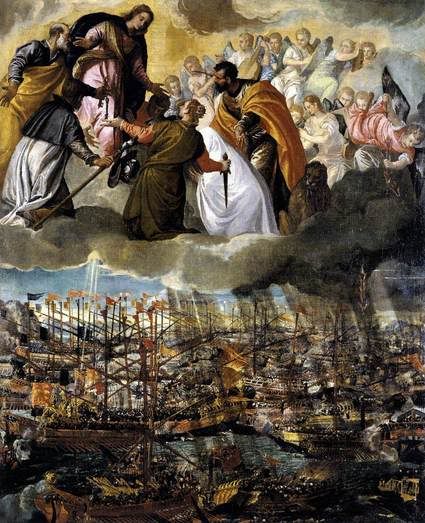
Labels: Our Blessed Lady
Monday, October 05, 2009
Pray For the Poor People In the Philippines
One has to be moved at the terrible devastation caused by the typhoon in the Philippines. Please join me in praying for rapid recovery for this Catholic country.
Labels: Prayer Requests
Sunday, October 04, 2009
The Eighteenth Sunday After Pentecost
From The Liturgical Year, by Abbot Prosper Gueranger, OSB:
THE paralytic carrying his bed is the subject of this day's Gospel, and gives the eighteenth Sunday after Pentecost its title. This Sunday is inserted in the missal immediately after the Ember-days of autumn. We will not, like the liturgists of the Middle Ages, 1 discuss the question of its having taken the place of the vacant Sunday, which formerly used always to follow the ordination of the sacred ministers, 2 in the manner we have elsewhere described, 3 Manuscript sacramentaries and lectionaries of very ancient date give it the name, which was so much in use, of Dominica vacat.4 Whatever may be the conclusion arrived at, there is one interesting point for consideration, viz., that in the Mass of this day the order of the lessons taken from St. Paul is broken. The Letter to the Ephesians, which has furnished the Epistles since the sixth Sunday after Pentecost, is to-day interrupted, and in its stead we have some verses from the first Epistle to the Corinthians, wherein the apostle gives thanks to God for the manifold gratuitous gifts granted, in Christ Jesus, to the Church. Now, the powers conferred by the imposition of the bishop's hands on the ministers of the Church are the most marvellous gift that is known on earth, yea, in heaven itself. The other portions of the Mass, too, are, as we shall see further on, most appropriate to the prerogatives of the new priesthood. So that the liturgy of the present Sunday is particularly interesting when it immediately follows the Ember-days of September. But this coincidence is not of very frequent occurrence, at least as the liturgy now stands; nor can we dwell longer on these subjects without going too far into archæology, and exceeding our limits.
MASS
The Introits of the Sunday Masses since Pentecost have hitherto been taken from the Psalter. From Ps. xii. to Ps. cxviii, the Church, without ever changing the order of these sacred canticles, chose from each of them, as its own turn came, the verses most appropriate to the liturgy of each Sunday. But, dating from to-day, she is going to select her Introits elsewhere, with one exception, however, when she will again turn to this, the Book by excellence of divine praise. Her future opening anthems for the dominical liturgy to the end of the year will be taken from various other Books of the old Testament. For this eighteenth Sunday we have Jesus, son of Sirach, the inspired writer of Ecclesiasticus, asking God to ratify the fidelity of His prophets5 by the accomplishment of what they foretold. The present interpreters of the divine oracles are the pastors, whom the Church sends, in her own name, to preach the word of salvation and peace:let us, her children, pray with her that their words may never be void.
EPISTLE
The last coming of the Son of Man is no longer far off! The approach of that final event, which is to put the Church in full possession of her divine Spouse, redoubles her hopes; but the last judgment, which is also to pronounce the eternal perdition of so great a number of her children, mingles fear with her desire; and these two sentiments of hers will henceforth be continually brought forward in the holy liturgy.
It is evident that expectation has been, so to say, an essential characteristic of her existence. Separated from her Lord, she would have been sighing all day long in this vale of tears, had not the love which possesses her driven her to spend herself, unselfishly and unreservedly, for Him who is absolute Master of her whole heart. She, therefore, devotes herself to labour and suffering, to prayers and tears. But her devotedness, unlimited as it has been, has not made her hopes less ardent. A love without desires is not a virtue of the Church; she condemns it in her children as being an insult to the Spouse.
So just and, at the same time, so intense were, from the very first, these her aspirations that eternal Wisdom wished to spare His bride, by concealing from her the duration of her exile. The day and hour of His return is the one sole point upon which, when questioned by His apostles, Jesus refused to enlighten His Church. 6 That secret constituted one of the designs of God's government of the world; but, besides that, it was also a proof of the compassion and affection of the Man-God; the trial would have been too cruel; and it was better to leave the Church under the impression, which after all was a true one, that the end was nigh in God's sight, with whom a thousand years are as one day.7 This explains how it is that the apostles, the interpreters of the Church's aspirations, are continually recurring to the subject of the near approach of our Lord's coming. St. Paul has just been telling us, and that twice over in the same breath, that the Christian is he who waiteth for the manifestation of our Lord Jesus Christ, and for the day of His coming. In his Epistle to the Hebrews, he applies to the second coming the inflamed desires of the ancient prophets for the first, and says: 'Yet a little, and a very little while, and He that is to come, will come, and will not delay.' 8 The reason is that, under the new Covenant as under the old, the Man-God is called, on account of His final manifestation, which is always being looked for, He that is coming, He that is to come.9 The cry which is to close the world's history is to be the announcement of His arrival: 'Behold! the Bridegroom is coming.'10 And St. Peter, too, says: 'Having the loins of your mind girt up, think of the glory of that day whereon the Lord Jesus is to be revealed! Hope for it, with a perfect hope!'11 The prince of the apostles foresaw the contemptuous way in which future false teachers would scoff at this long-expected, but always put-off, coming: 'Where is His promise, or His coming? For, since the fathers slept, all things continue so, from the beginning of the creation!'12 Yes, he foresaw this, and forestalled their sarcasm, by answering it in the words which his brother Paul 13 had previously used: 14 'The Lord delayeth not His promise, as some imagine; but dealeth patiently, for your sake, not willing that any should perish, but that all should return to penance. But the day of the Lord shall come as a thief, in which the heavens shall pass away with great violence; and the elements shall be melted with heat; and the earth, and the works which are in it, shall be burnt up. Seeing, then, that all these things are to be dissolved, what manner of people ought you to be in holy conversation and godliness, looking for, and hastening unto, the coming of the day of the Lord, by which the heavens, being on fire, shall be dissolved, and the elements shall melt with the burning heat of fire? But we look for new heavens and a new earth according to His promises, in which justice dwelleth. Wherefore, dearly beloved, seeing that you look for these things, be diligent that ye may be found undefiled and unspotted to Him in peace.... Wherefore, brethren, knowing these things before, take heed lest, being led aside by the error of the unwise, you fall from your own steadfastness.'15
GOSPEL
In the thirteenth century, in many Churches of the west, the Gospel for to-day was that wherein our Lord speaks of the scribes and pharisees as seated on the chair of Moses.22 The Abbot Rupert, who gives us this detail in his book on the Divine Offices, shows how admirably this Gospel harmonized with the Offertory, which is the one we still have, and which alludes to Moses. 'This Sunday's Office,' says he, 'eloquently points out, to him who presides over the house of the Lord and has received charge of souls, the manner in which he should comport himself in the high rank, where the divine call has placed him. Let him not imitate those men, who unworthily sat on the chair of Moses; but let him follow the example of Moses himself, who, in the Offertory and its verses, presents the heads of the Church with such a model of perfection. Pastors of souls ought, on no account, to be ignorant of the reason why they are placed higher than other men: it is not so much that they may govern others, as that they may serve them.'23 Our Lord, speaking of the Jewish doctors, said: 'All whatsoever they shall say to you, observe and do; but according to their works, do ye not: for they say, and do not.'24 Contrariwise to these unworthy guardians of the Law, they that are seated on the chair of doctrine 'should teach, and act conformably to their teaching,' as the same Abbot Rupert adds. 'Or, rather,' says he, 'let them first do what it is their duty to do, that they may afterwards teach with authority; let them not seek after honours and titles, but make this their one object, to bear on themselves the sins of the people, and to merit to avert the wrath of God from those who are confided to their care. Such, we are told in the Offertory, is the example given them by Moses.'25
The Gospel which speaks of the scribes and pharisees who were seated on the chair of Moses has now been appointed for the Tuesday of the second week of Lent. But the one which is at present given for this Sunday equally directs our thoughts to the consideration of the superhuman powers of the priesthood, which are the common boon of regenerated humanity. The faithful, whose attention used formerly, on this Sunday, to be fixed on the right of teaching which is confided to the pastors of the Church, are now invited to meditate upon the prerogative which these same men have of forgiving sins and healing souls. Even if their conduct be in opposition to their teaching, it in nowise interferes with the authority of the sacred chair, from which, for the Church and in her name, they dispense the bread of doctrine to her children. Moreover, whatever unworthiness may happen to be in the soul of a priest, it does not in the least lessen the power of the keys which have been put into his hands to open heaven and to shut hell. For it is the Son of Man, Jesus, who, by the priest, be he a saint, or be he a sinner, rids of their sins His brethren and His creatures, whose miseries He has taken upon Himself, and whose crimes He has atoned for by His Blood:26
The miracle of the cure of the paralytic, which gave an occasion to Jesus of declaring His power of forgiving sins inasmuch as he was Son of Man, has always been especially dear to the Church. Besides the narration she gives us of it from St. Matthew in to-day's Gospel, she again, on the Ember Friday of Whitsuntide, relates it in the words of St. Luke.27 The Catacomb frescoes, which have been preserved to the present day, equally attest the predilection for this subject, wherewith she inspired the Christian artists of the first centuries. From the very beginning of Christianity, heretics had risen up denying that the Church had the power, which her divine Head gave her, of remitting sin. Such false teaching would irretrievably condemn to spiritual death an immense number of Christians, who, unhappily, had fallen after their Baptism, but who, according to Catholic dogma, might be restored to grace by the sacrament of Penance. With what energy, then, would our mother the Church defend the remedy which gives life to her children! She uttered her anathemas upon, and drove from her communion, those pharisees of the new law, who, like their Jewish predecessors, refused to acknowledge the infinite mercy and universality of the great mystery of the Redemption.
Like to her divine Master, who had worked under the eyes of the scribes, His contradictors, the Church, too, in proof of her consoling doctrine, had worked an undeniable and visible miracle in the presence of the false teachers; and yet she had failed to convince them of the reality of the miracle of sanctification and grace invisibly wrought by her words of remission and pardon. The outward cure of the paralytic was both the image and the proof of the cure of his soul, which previously bad been in a state of moral paralysis; but he himself represented another sufferer, viz., the human race, which for ages had been a victim to the palsy of sin. Our Lord had already left the earth, when the faith of the apostles achieved this, their first prodigy, of bringing to the Church the world grown old in its infirmity. Finding that the human race was docile to the teaching of the divine messengers, and was already an imitator of their faith, the Church spoke as a mother, and said: Be of good heart, son! thy sins are forgiven thee! At once, to the astonishment of the philosophers and sceptics, and to the confusion of hell, the world rose up from its long and deep humiliation; and, to prove how thoroughly his strength had been restored to him, he was seen carrying on his shoulders, by the labour of penance and the mastery over his passions, the bed of his old exhaustion and feebleness, on which pride, lust, and covetousness had so long held him. From that time forward, complying with the word of Jesus, which was also said to him by the Church, he has been going on towards his house, which is heaven, where eternal joy awaits him! And the angels, beholding such a spectacle of conversion and holiness,28 are in amazement, and sing glory to God, who gave such power to men.
THE paralytic carrying his bed is the subject of this day's Gospel, and gives the eighteenth Sunday after Pentecost its title. This Sunday is inserted in the missal immediately after the Ember-days of autumn. We will not, like the liturgists of the Middle Ages, 1 discuss the question of its having taken the place of the vacant Sunday, which formerly used always to follow the ordination of the sacred ministers, 2 in the manner we have elsewhere described, 3 Manuscript sacramentaries and lectionaries of very ancient date give it the name, which was so much in use, of Dominica vacat.4 Whatever may be the conclusion arrived at, there is one interesting point for consideration, viz., that in the Mass of this day the order of the lessons taken from St. Paul is broken. The Letter to the Ephesians, which has furnished the Epistles since the sixth Sunday after Pentecost, is to-day interrupted, and in its stead we have some verses from the first Epistle to the Corinthians, wherein the apostle gives thanks to God for the manifold gratuitous gifts granted, in Christ Jesus, to the Church. Now, the powers conferred by the imposition of the bishop's hands on the ministers of the Church are the most marvellous gift that is known on earth, yea, in heaven itself. The other portions of the Mass, too, are, as we shall see further on, most appropriate to the prerogatives of the new priesthood. So that the liturgy of the present Sunday is particularly interesting when it immediately follows the Ember-days of September. But this coincidence is not of very frequent occurrence, at least as the liturgy now stands; nor can we dwell longer on these subjects without going too far into archæology, and exceeding our limits.
MASS
The Introits of the Sunday Masses since Pentecost have hitherto been taken from the Psalter. From Ps. xii. to Ps. cxviii, the Church, without ever changing the order of these sacred canticles, chose from each of them, as its own turn came, the verses most appropriate to the liturgy of each Sunday. But, dating from to-day, she is going to select her Introits elsewhere, with one exception, however, when she will again turn to this, the Book by excellence of divine praise. Her future opening anthems for the dominical liturgy to the end of the year will be taken from various other Books of the old Testament. For this eighteenth Sunday we have Jesus, son of Sirach, the inspired writer of Ecclesiasticus, asking God to ratify the fidelity of His prophets5 by the accomplishment of what they foretold. The present interpreters of the divine oracles are the pastors, whom the Church sends, in her own name, to preach the word of salvation and peace:let us, her children, pray with her that their words may never be void.
EPISTLE
The last coming of the Son of Man is no longer far off! The approach of that final event, which is to put the Church in full possession of her divine Spouse, redoubles her hopes; but the last judgment, which is also to pronounce the eternal perdition of so great a number of her children, mingles fear with her desire; and these two sentiments of hers will henceforth be continually brought forward in the holy liturgy.
It is evident that expectation has been, so to say, an essential characteristic of her existence. Separated from her Lord, she would have been sighing all day long in this vale of tears, had not the love which possesses her driven her to spend herself, unselfishly and unreservedly, for Him who is absolute Master of her whole heart. She, therefore, devotes herself to labour and suffering, to prayers and tears. But her devotedness, unlimited as it has been, has not made her hopes less ardent. A love without desires is not a virtue of the Church; she condemns it in her children as being an insult to the Spouse.
So just and, at the same time, so intense were, from the very first, these her aspirations that eternal Wisdom wished to spare His bride, by concealing from her the duration of her exile. The day and hour of His return is the one sole point upon which, when questioned by His apostles, Jesus refused to enlighten His Church. 6 That secret constituted one of the designs of God's government of the world; but, besides that, it was also a proof of the compassion and affection of the Man-God; the trial would have been too cruel; and it was better to leave the Church under the impression, which after all was a true one, that the end was nigh in God's sight, with whom a thousand years are as one day.7 This explains how it is that the apostles, the interpreters of the Church's aspirations, are continually recurring to the subject of the near approach of our Lord's coming. St. Paul has just been telling us, and that twice over in the same breath, that the Christian is he who waiteth for the manifestation of our Lord Jesus Christ, and for the day of His coming. In his Epistle to the Hebrews, he applies to the second coming the inflamed desires of the ancient prophets for the first, and says: 'Yet a little, and a very little while, and He that is to come, will come, and will not delay.' 8 The reason is that, under the new Covenant as under the old, the Man-God is called, on account of His final manifestation, which is always being looked for, He that is coming, He that is to come.9 The cry which is to close the world's history is to be the announcement of His arrival: 'Behold! the Bridegroom is coming.'10 And St. Peter, too, says: 'Having the loins of your mind girt up, think of the glory of that day whereon the Lord Jesus is to be revealed! Hope for it, with a perfect hope!'11 The prince of the apostles foresaw the contemptuous way in which future false teachers would scoff at this long-expected, but always put-off, coming: 'Where is His promise, or His coming? For, since the fathers slept, all things continue so, from the beginning of the creation!'12 Yes, he foresaw this, and forestalled their sarcasm, by answering it in the words which his brother Paul 13 had previously used: 14 'The Lord delayeth not His promise, as some imagine; but dealeth patiently, for your sake, not willing that any should perish, but that all should return to penance. But the day of the Lord shall come as a thief, in which the heavens shall pass away with great violence; and the elements shall be melted with heat; and the earth, and the works which are in it, shall be burnt up. Seeing, then, that all these things are to be dissolved, what manner of people ought you to be in holy conversation and godliness, looking for, and hastening unto, the coming of the day of the Lord, by which the heavens, being on fire, shall be dissolved, and the elements shall melt with the burning heat of fire? But we look for new heavens and a new earth according to His promises, in which justice dwelleth. Wherefore, dearly beloved, seeing that you look for these things, be diligent that ye may be found undefiled and unspotted to Him in peace.... Wherefore, brethren, knowing these things before, take heed lest, being led aside by the error of the unwise, you fall from your own steadfastness.'15
GOSPEL
In the thirteenth century, in many Churches of the west, the Gospel for to-day was that wherein our Lord speaks of the scribes and pharisees as seated on the chair of Moses.22 The Abbot Rupert, who gives us this detail in his book on the Divine Offices, shows how admirably this Gospel harmonized with the Offertory, which is the one we still have, and which alludes to Moses. 'This Sunday's Office,' says he, 'eloquently points out, to him who presides over the house of the Lord and has received charge of souls, the manner in which he should comport himself in the high rank, where the divine call has placed him. Let him not imitate those men, who unworthily sat on the chair of Moses; but let him follow the example of Moses himself, who, in the Offertory and its verses, presents the heads of the Church with such a model of perfection. Pastors of souls ought, on no account, to be ignorant of the reason why they are placed higher than other men: it is not so much that they may govern others, as that they may serve them.'23 Our Lord, speaking of the Jewish doctors, said: 'All whatsoever they shall say to you, observe and do; but according to their works, do ye not: for they say, and do not.'24 Contrariwise to these unworthy guardians of the Law, they that are seated on the chair of doctrine 'should teach, and act conformably to their teaching,' as the same Abbot Rupert adds. 'Or, rather,' says he, 'let them first do what it is their duty to do, that they may afterwards teach with authority; let them not seek after honours and titles, but make this their one object, to bear on themselves the sins of the people, and to merit to avert the wrath of God from those who are confided to their care. Such, we are told in the Offertory, is the example given them by Moses.'25
The Gospel which speaks of the scribes and pharisees who were seated on the chair of Moses has now been appointed for the Tuesday of the second week of Lent. But the one which is at present given for this Sunday equally directs our thoughts to the consideration of the superhuman powers of the priesthood, which are the common boon of regenerated humanity. The faithful, whose attention used formerly, on this Sunday, to be fixed on the right of teaching which is confided to the pastors of the Church, are now invited to meditate upon the prerogative which these same men have of forgiving sins and healing souls. Even if their conduct be in opposition to their teaching, it in nowise interferes with the authority of the sacred chair, from which, for the Church and in her name, they dispense the bread of doctrine to her children. Moreover, whatever unworthiness may happen to be in the soul of a priest, it does not in the least lessen the power of the keys which have been put into his hands to open heaven and to shut hell. For it is the Son of Man, Jesus, who, by the priest, be he a saint, or be he a sinner, rids of their sins His brethren and His creatures, whose miseries He has taken upon Himself, and whose crimes He has atoned for by His Blood:26
The miracle of the cure of the paralytic, which gave an occasion to Jesus of declaring His power of forgiving sins inasmuch as he was Son of Man, has always been especially dear to the Church. Besides the narration she gives us of it from St. Matthew in to-day's Gospel, she again, on the Ember Friday of Whitsuntide, relates it in the words of St. Luke.27 The Catacomb frescoes, which have been preserved to the present day, equally attest the predilection for this subject, wherewith she inspired the Christian artists of the first centuries. From the very beginning of Christianity, heretics had risen up denying that the Church had the power, which her divine Head gave her, of remitting sin. Such false teaching would irretrievably condemn to spiritual death an immense number of Christians, who, unhappily, had fallen after their Baptism, but who, according to Catholic dogma, might be restored to grace by the sacrament of Penance. With what energy, then, would our mother the Church defend the remedy which gives life to her children! She uttered her anathemas upon, and drove from her communion, those pharisees of the new law, who, like their Jewish predecessors, refused to acknowledge the infinite mercy and universality of the great mystery of the Redemption.
Like to her divine Master, who had worked under the eyes of the scribes, His contradictors, the Church, too, in proof of her consoling doctrine, had worked an undeniable and visible miracle in the presence of the false teachers; and yet she had failed to convince them of the reality of the miracle of sanctification and grace invisibly wrought by her words of remission and pardon. The outward cure of the paralytic was both the image and the proof of the cure of his soul, which previously bad been in a state of moral paralysis; but he himself represented another sufferer, viz., the human race, which for ages had been a victim to the palsy of sin. Our Lord had already left the earth, when the faith of the apostles achieved this, their first prodigy, of bringing to the Church the world grown old in its infirmity. Finding that the human race was docile to the teaching of the divine messengers, and was already an imitator of their faith, the Church spoke as a mother, and said: Be of good heart, son! thy sins are forgiven thee! At once, to the astonishment of the philosophers and sceptics, and to the confusion of hell, the world rose up from its long and deep humiliation; and, to prove how thoroughly his strength had been restored to him, he was seen carrying on his shoulders, by the labour of penance and the mastery over his passions, the bed of his old exhaustion and feebleness, on which pride, lust, and covetousness had so long held him. From that time forward, complying with the word of Jesus, which was also said to him by the Church, he has been going on towards his house, which is heaven, where eternal joy awaits him! And the angels, beholding such a spectacle of conversion and holiness,28 are in amazement, and sing glory to God, who gave such power to men.
Labels: The Liturgical Year
If Today Were Not A Sunday
it would be liturgically observed as the feast of Saint Francis of Assisi
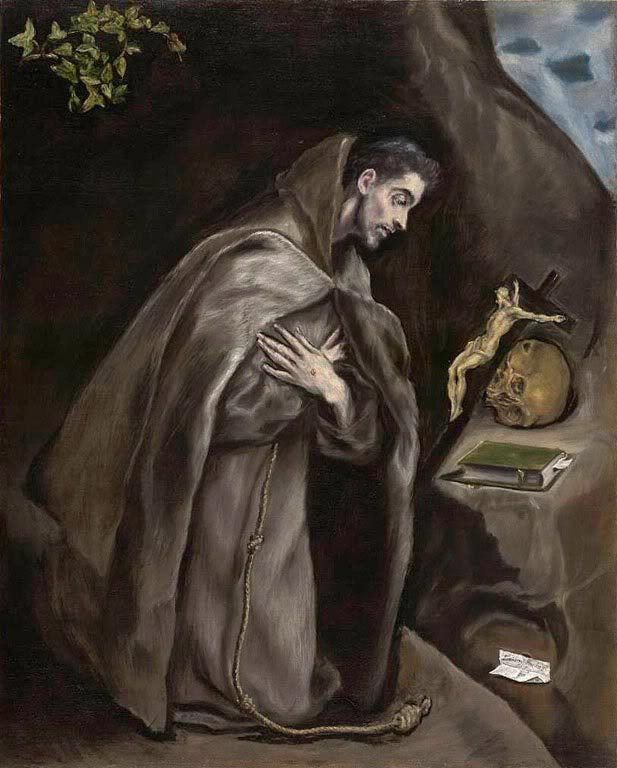
Saint Francis is a great saint, if you can get past the syrupy nonsense people who claim to be devoted to him claim is his legacy. Aside from his personal holiness, and I doubt that many could take holiness to a higher level than Francis did, there is his founding of one of the most important orders in the history of Christendom 9actually, he founded three orders, and others have sprung up from that tradition and family of orders), his invention of the Christmas creche scene, his extension of the love of Christ to animals and all creation, and his being a stigmatist, his is also one of the most striking conversion stories in the history of the Church.
The Golden Legend
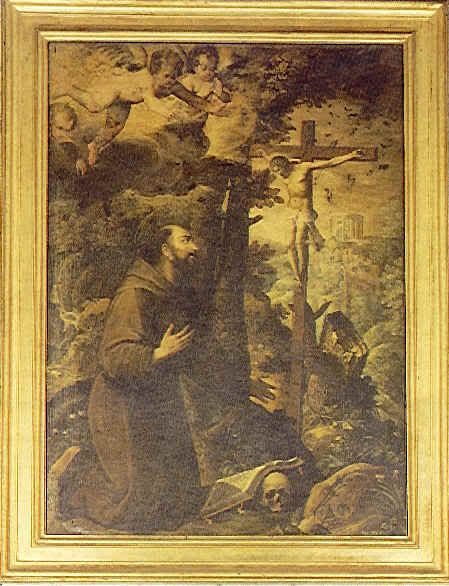
The Catholic Encyclopedia
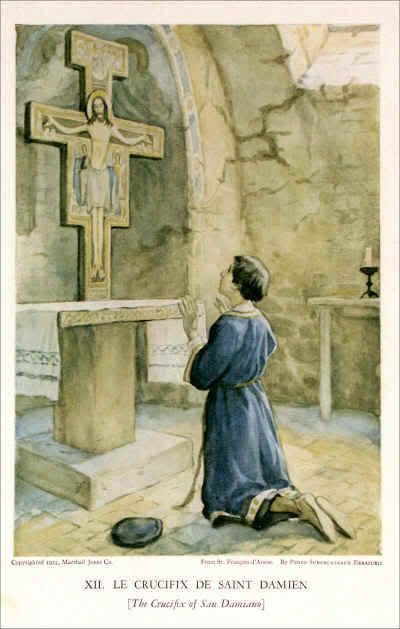
Saint Francis took mortification of the flesh very seriously. When he found the desires of the flesh beginning to take hold, he used to roll around in thorn bushes, to drive them away. If only moderns did that, I doubt we would have heard anything of a pervert priest scandal these last 5 years.
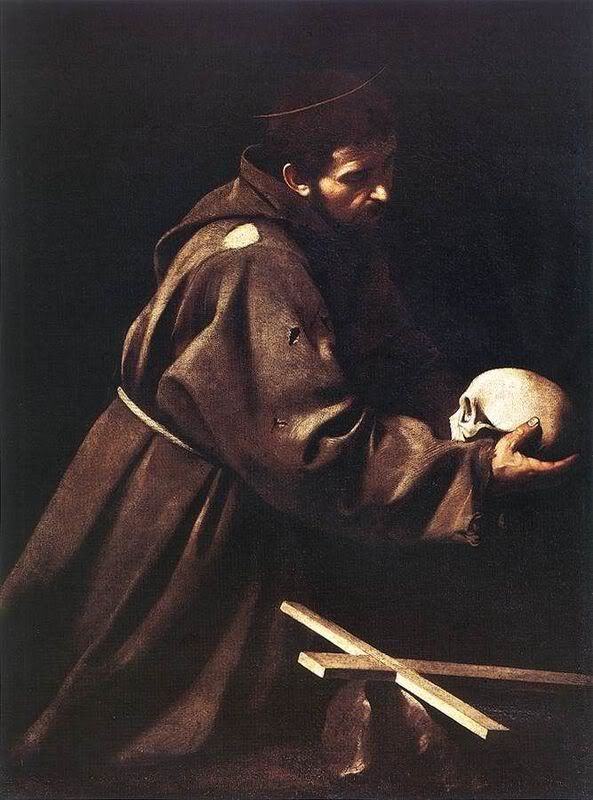
There was no humbug about Saint Francis. He truly loved those in need, the poor, and all creation. Where friars since his time have grown fat and overfed, with far too much luxury for a mendicant order, he, who came from wealth, lived a life of real poverty. And where modern friars make a show of doing good works institutionally, but then drive the poor from their own door, Saint Francis adopted a radical love for others that involved genuine giving of himself.
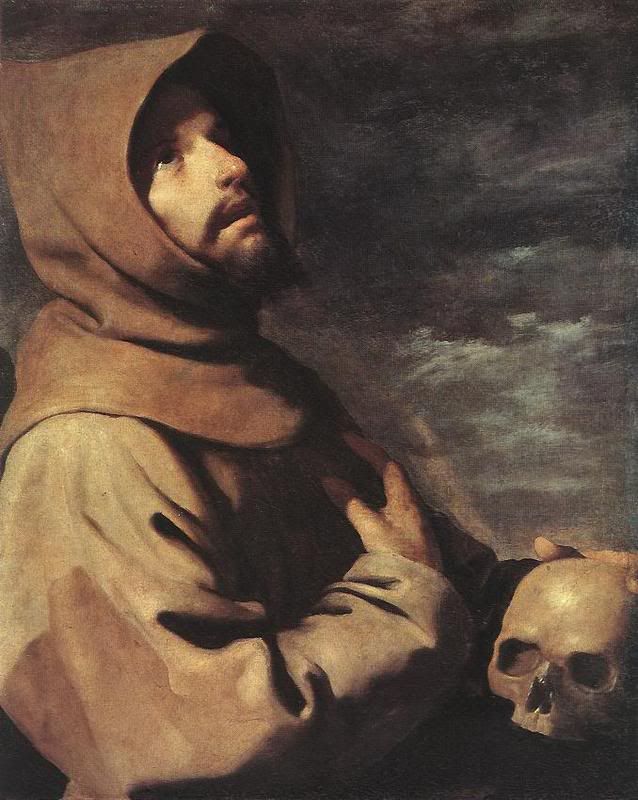
Saint Francis entertained an abiding, even fierce desire to give his life for the Faith. He made several efforts to go to Moslem lands, so that he would be martyred. But obstacles prevented his first efforts. But he persisted. When he finally made it to Moslem-controlled territory, the local emir or pasha listened politely to him, discoursed with him, and then sent him back to Italy. Later, when some seven of his followers were martyred by the Moslems, he exclaimed, "Now I have seven true friars minor!". Thwarted in his own effort to die for the Faith, he recklessly undertook dramatic penances, and did things like embracing lepers.
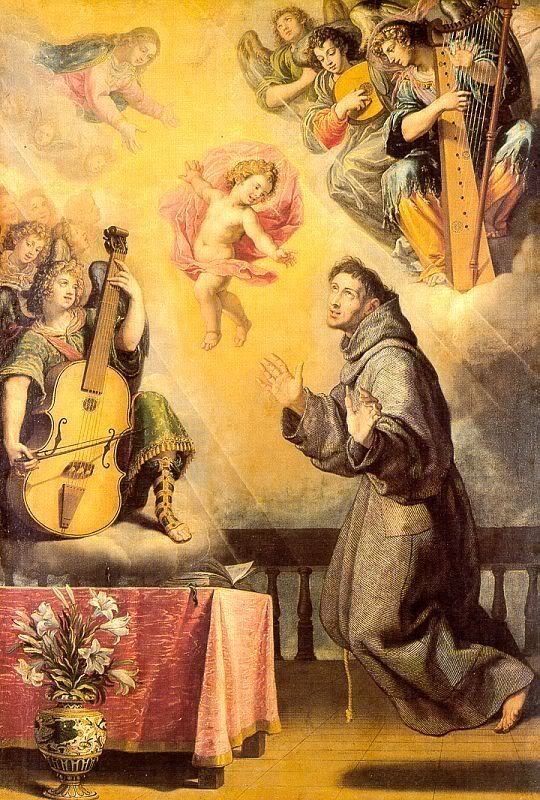
The stigmata he received, like that of Saint Padre Pio, gave constant pain and discharge. Also like Pio, he had the gift of bilocation.
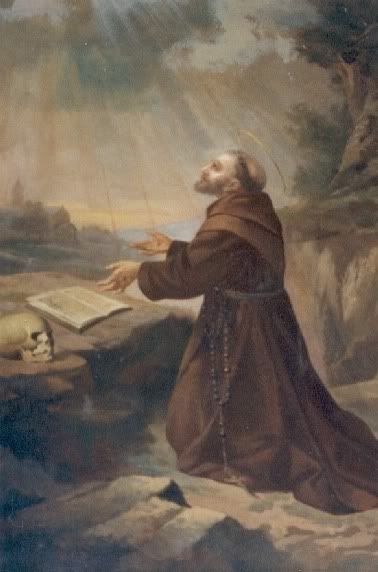
One thing most people don't know about Saint Francis is that he was never ordained a priest. He could never say Mass. All he could do was assist at Mass. Why wasn't he ordained? Was he illiterate? No. Too stupid to learn the Latin? No. He was too humble to take onto himself the role of the priest.
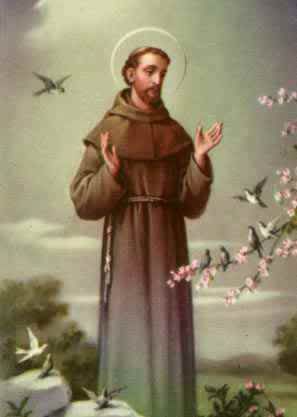
Put aside the phony "Prayer of Saint Francis" which he had nothing to do with, and was not even written until the 20th century, when it was "discovered" by an American bishop visiting Italy. Pray instead this prayer, truly the work of Saint Francis:
Hail Lady, Holy Queen, Holy Mary Mother of God,
Who art the Virgin made Church
And the One elect by the Most Holy Father of Heaven,
Whom He consecrated with His Most Holy beloved Son
And with the Holy Ghost, the Paraclete;
Thou in whom was and is all fullness of grace and every good.
Hail His Palace;
Hail His Tabernacle;
Hail His Home.
Hail His Vestment;
Hail His Handmaid;
Hail His Mother
And hail all thee holy virtues, which through the grace and illumination of the Holy Ghost are infused into the hearts of the faithful, so that from those unfaithful thou make them faithful to God.
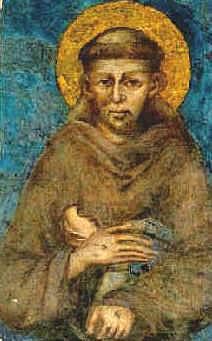
Or this prayer, which he said before the Crucifix of San Damiano, when he was given his commission:
All-highest, glorious God, cast Thy light into the darkness of my heart. Give me true faith, firm hope, perfect charity and profound humility, with wisdom and perception, O Lord, so that I may do what is truly Thy holy Will.
Amen.
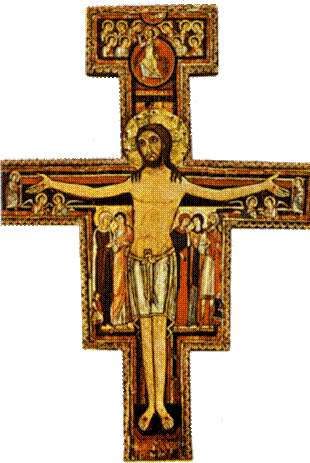

Saint Francis is a great saint, if you can get past the syrupy nonsense people who claim to be devoted to him claim is his legacy. Aside from his personal holiness, and I doubt that many could take holiness to a higher level than Francis did, there is his founding of one of the most important orders in the history of Christendom 9actually, he founded three orders, and others have sprung up from that tradition and family of orders), his invention of the Christmas creche scene, his extension of the love of Christ to animals and all creation, and his being a stigmatist, his is also one of the most striking conversion stories in the history of the Church.
The Golden Legend

The Catholic Encyclopedia

Saint Francis took mortification of the flesh very seriously. When he found the desires of the flesh beginning to take hold, he used to roll around in thorn bushes, to drive them away. If only moderns did that, I doubt we would have heard anything of a pervert priest scandal these last 5 years.

There was no humbug about Saint Francis. He truly loved those in need, the poor, and all creation. Where friars since his time have grown fat and overfed, with far too much luxury for a mendicant order, he, who came from wealth, lived a life of real poverty. And where modern friars make a show of doing good works institutionally, but then drive the poor from their own door, Saint Francis adopted a radical love for others that involved genuine giving of himself.

Saint Francis entertained an abiding, even fierce desire to give his life for the Faith. He made several efforts to go to Moslem lands, so that he would be martyred. But obstacles prevented his first efforts. But he persisted. When he finally made it to Moslem-controlled territory, the local emir or pasha listened politely to him, discoursed with him, and then sent him back to Italy. Later, when some seven of his followers were martyred by the Moslems, he exclaimed, "Now I have seven true friars minor!". Thwarted in his own effort to die for the Faith, he recklessly undertook dramatic penances, and did things like embracing lepers.

The stigmata he received, like that of Saint Padre Pio, gave constant pain and discharge. Also like Pio, he had the gift of bilocation.

One thing most people don't know about Saint Francis is that he was never ordained a priest. He could never say Mass. All he could do was assist at Mass. Why wasn't he ordained? Was he illiterate? No. Too stupid to learn the Latin? No. He was too humble to take onto himself the role of the priest.

Put aside the phony "Prayer of Saint Francis" which he had nothing to do with, and was not even written until the 20th century, when it was "discovered" by an American bishop visiting Italy. Pray instead this prayer, truly the work of Saint Francis:
Hail Lady, Holy Queen, Holy Mary Mother of God,
Who art the Virgin made Church
And the One elect by the Most Holy Father of Heaven,
Whom He consecrated with His Most Holy beloved Son
And with the Holy Ghost, the Paraclete;
Thou in whom was and is all fullness of grace and every good.
Hail His Palace;
Hail His Tabernacle;
Hail His Home.
Hail His Vestment;
Hail His Handmaid;
Hail His Mother
And hail all thee holy virtues, which through the grace and illumination of the Holy Ghost are infused into the hearts of the faithful, so that from those unfaithful thou make them faithful to God.

Or this prayer, which he said before the Crucifix of San Damiano, when he was given his commission:
All-highest, glorious God, cast Thy light into the darkness of my heart. Give me true faith, firm hope, perfect charity and profound humility, with wisdom and perception, O Lord, so that I may do what is truly Thy holy Will.
Amen.

Labels: If Today Were Not A Sunday
Today Would Have Been My Father's 89th Birthday
He died December 31, 1989, at the age of 69.
O God, who hast commanded us to honor our father and our mother; in Thy mercy have pity on the souls of George my father and Kathryn my mother, and forgive them their trespasses; and make me to see them again in the joy of everlasting brightness. Through Christ our Lord.
Amen.
V. Requiem aeternam dona ei, Domine,
R. Et lux perpetua luceat ei.
V. Requiescat in pace.
R. Amen.
“The Old Man”
The tears have all been shed now
We've said our last good-byes
His soul's been blessed and he's laid to rest
And it's now I feel alone.
He was more than just a father
My teacher, my best friend
He can still be heard in the tunes we shared
When I play them on my own.
I never will forget him for he made me what I am
Though he may be gone memory lingers on
And I miss him ... The Old Man.
As a boy he'd take me walkin'
By mountian, field, and stream
And he showed me things not known to kings
Just secret between him and me.
Like the colors of a pheasant
As he rises in the dawn
And how to fish and make a wish
Beside the holly tree
I never will forget him for he made me what I am
Though he may be gone memory lingers on
And I miss him ... The Old Man.
I thought he'd live forever
He seemed so big and strong
But the minutes fly and the years roll by
For a father and his son
And suddenly when it happened
There was so much left unsaid
No second chance to tell him thanks
For everything he'd done
I never will forget him for he made me what I am
Though he may be gone memories linger on
God, I miss him ... The Old Man.
Phil Coulter's song, performed by George Donaldson of Celtic Thunder:
O God, who hast commanded us to honor our father and our mother; in Thy mercy have pity on the souls of George my father and Kathryn my mother, and forgive them their trespasses; and make me to see them again in the joy of everlasting brightness. Through Christ our Lord.
Amen.
V. Requiem aeternam dona ei, Domine,
R. Et lux perpetua luceat ei.
V. Requiescat in pace.
R. Amen.
“The Old Man”
The tears have all been shed now
We've said our last good-byes
His soul's been blessed and he's laid to rest
And it's now I feel alone.
He was more than just a father
My teacher, my best friend
He can still be heard in the tunes we shared
When I play them on my own.
I never will forget him for he made me what I am
Though he may be gone memory lingers on
And I miss him ... The Old Man.
As a boy he'd take me walkin'
By mountian, field, and stream
And he showed me things not known to kings
Just secret between him and me.
Like the colors of a pheasant
As he rises in the dawn
And how to fish and make a wish
Beside the holly tree
I never will forget him for he made me what I am
Though he may be gone memory lingers on
And I miss him ... The Old Man.
I thought he'd live forever
He seemed so big and strong
But the minutes fly and the years roll by
For a father and his son
And suddenly when it happened
There was so much left unsaid
No second chance to tell him thanks
For everything he'd done
I never will forget him for he made me what I am
Though he may be gone memories linger on
God, I miss him ... The Old Man.
Phil Coulter's song, performed by George Donaldson of Celtic Thunder:
Labels: Requiescat In Pace







































































































